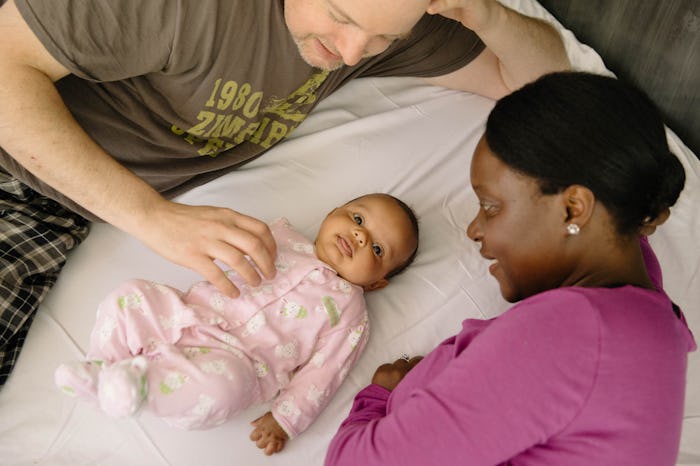A couple months after I had my first kid, I started getting a nosy question that no new mom wants to deal with — "So when do you want to start trying for number two?" I was tempted to reply with a firm never, just because I was exhausted and barely conscious most of the time, but once my daughter hit toddlerhood, I did begin having those baby pangs again. Family planning, however, can get tricky and you might be wondering like I did — how long should you wait to get pregnant with your second baby? Of course, only you and your partner can decide what's best for your family, but the medical community does offer advice on how far apart to space your kids.
Ideally, you should wait at least 18 to 24 months after a live birth before getting pregnant again, suggested the Mayo Clinic. This is due to a number of factors, including giving the mother plenty of time to heal. Pregnancy and delivery, after all, can put a lot of wear and tear on your body, from inflammation to infection to depleting your nutrient supply, according to the March of Dimes. (Thanks a lot, kid.) And so, widening the time gap between your pregnancies will allow your body to rest, recover, and restore those nutrients that your adorable infant stealthily absorbed from you.
Another reason to space out your kids is to reduce your baby's risk factors. Baby Center reported that infants conceived within seven to 17 months of a previous birth have a higher chance of being born prematurely or with a low birth weight. These risks jump even higher for newborns conceived within six months of an older sibling's delivery. Don't panic though if your pregnancies are spaced closely together, but do try to attend all of your prenatal visits and talk with your medical provider about ensuring the healthiest pregnancy possible.
There are certain instances when your doctor will give you the green light to conceive before the 18 to 24 month window is up. If you're older than 35 or if you've struggled with infertility, for example, be sure to ask your OB-GYN when you can start trying for your second. You should also talk to your provider if you've had a miscarriage or stillbirth — you may be able to start trying sooner rather than later.
Family planning can be complicated, from deciding when to start having kids to figuring out when you're officially done. While the medical community can offer advice on how far apart to space your children, you might decide to have your babies closer together or you might find yourself unexpectedly pregnant with a 9-month-old in tow. Just remember that you and your partner will figure out the best path forward for your family. You're the ones in the driver's seat.
